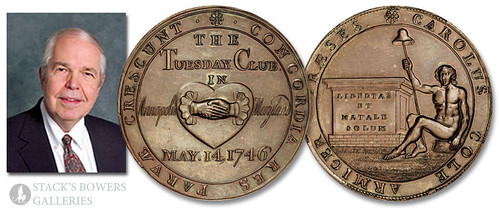
PREV ARTICLE
NEXT ARTICLE
FULL ISSUE
PREV FULL ISSUE
V25 2022 INDEX E-SYLUM ARCHIVE THE ANNAPOLIS TUESDAY CLUB MEDALIn a Stack's Bowers blog article, Dave Bowers discusses one of my favorite rare-as-hell medals, the 1746 Annapolis Tuesday Club medal. -Editor Recognized as a great rarity today is the membership medal of the Tuesday Club, a piece that revives the memory of life in the beautiful port city of Annapolis at the middle of the 18th century. On the Severn River near its entrance to the Chesapeake, the small village first settled in 1649 became the colonial capital in 1694. By the time the Tuesday Club formed in 1746, the city had become an economic hub of Maryland with a population surpassing 25,000. An 1886 essay by F.B. Mayer in Frank Leslie's Popular Monthly recalls the era:
The group held biweekly meetings called sederunts in each other's homes, applying a set of exacting but lighthearted laws. One law made it mandatory to toast the health of the members' wives and ladies, "immediately after supper and before any other toasts or healths go round." Another, called the "Gelastic Law," stated: That if any subject of what nature soever be discussed, which levels at party matters, or the administration of the government of this province, or be disagreeable to the Club, no answer shall be given thereto, but after such discourse is ended, the Society shall laugh at the member offending, in order to divert the discourse. In May of 1748, the members authorized the striking of a gilded silver keepsake that holds the record as America's earliest club medal. Dr. Alexander Hamilton of Scotland, a founding member who later would write a 1,900-page History of the Tuesday Club, created the design and the dies were cut in London, possibly by John Kirk (according to C. Wyllys Betts), at a cost of 6 1/2 guineas. The Tuesday club medal's legends indicate what was most important to the group. CONCORDIA RES PARVAE CRESCUNT, which roughly translates to "happily joining like-thinking fellows" and "LIBERTAS ET NATALE SOLUM" means "liberty and homeland only." CAROLUS COLE of the obverse legend was Charles Cole, the club's first president. The Tuesday Club disbanded in 1756.
To read the complete article, see:
Wayne Homren, Editor The Numismatic Bibliomania Society is a non-profit organization promoting numismatic literature. See our web site at coinbooks.org. To submit items for publication in The E-Sylum, write to the Editor at this address: whomren@gmail.com To subscribe go to: https://my.binhost.com/lists/listinfo/esylum All Rights Reserved. NBS Home Page Contact the NBS webmaster 
|

